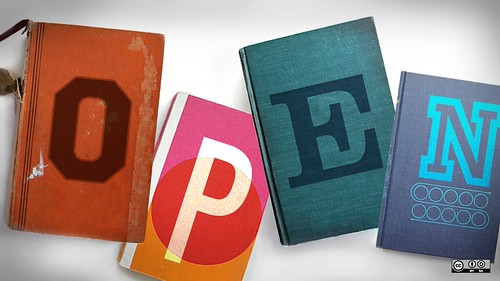Open Educational resources (OER) has been on the verge of mainstream breakthrough for the past ten years or so but, despite many convincing arguments and excellent research, it never manages to cross that threshold. Right now, UNESCO is inviting comments on its draft UNESCO Recommendation on Open Educational Resources (OER) that will result in a new set of recommendations to all member nations on the promotion and development of OER. This can be seen as a refinement of UNESCO's 2012 Paris OER Declaration which provided important top-level support for OER and raised the visibility of the field but failed to convince the majority of member nations to commit to the cause.
The question is whether OER will ever manage to go mainstream or whether it will remain a field for a committed minority of educators. This is discussed in an article by Tom Berger on Edutopia, The Uncertain Future of OER. The Achilles' heel of OER is the still time-consuming task of finding the right material. There are many repositories and search tools but it still takes time to find what you want and this, for the already stressed teacher, is the crucial factor. The traditional text books as well as the polished online resources available from the major publishers offer a fully structured set of quality resources, together with lesson plans and extra activities. Most teachers rightly wonder whether the time-consuming, do-it-yourself approach of OER is worth the effort compared to following the ready-made packages from the publishers.
Unlike Wikipedia, Yelp, and Airbnb, most OER websites have failed to attract a large and active audience, have no widely adopted mechanism for ranking or maintaining the quality and timeliness of the materials, and lag behind industry standards of design and usability. The resulting systems can be frustratingly complex and often spit back listings that are hard to make sense of—a nonstarter for busy K–12 teachers struggling to keep their heads above water.
OER is however a very sustainable approach if fully implemented. Teachers can share their resources and allow other teachers to adapt and repurpose as necessary as long as they follow the terms of the Creative Commons license and credit the author accordingly. However, many studies indicate that although there is a wealth of resources, very few teachers are actually adapting them and the risk is that repositories are flooded with ever more one-off resources. For OER to really take off teachers need to learn not only to find resources but also how to adapt them and share responsibly.
With textbook costs soaring there is increasing interest in producing open textbook, see for example the excellent example of the University of British Columbia's BC Open Textbooks. maybe this is the way forward for OER since open textbooks offer an attractive alternative that is easy for teachers to use and extremely popular with cash-strapped students.
But the problem remains of persuading teachers to learn how to find, share and adapt other people's resources instead of relying on ready packages from the publishers. A further complication is the quality issue; how do I know that this resource is trustworthy? Maybe blockchain technology can provide some kind of quality guarantee or link resources from diverse locations into sequences of related material. I don't know enough about this field to say any more on this but maybe some aspect of this technology can apply to OER.
The Edutopia article ends on a rather pessimistic note. I have a suspicion that the big breakthrough for OER will have to wait a while yet.
So will we ever get to a Wikipedia-type model of teaching resources, with teachers freely giving and taking textbooks, lesson plans, and tests, refining and improving them, and sharing their improvements? There’s no clear path right now to achieving that model—you can’t will the proper ecosystem into existence, and overburdened teachers haven’t built it up from the grassroots. Should we even want them to?

No comments:
Post a Comment
Note: Only a member of this blog may post a comment.